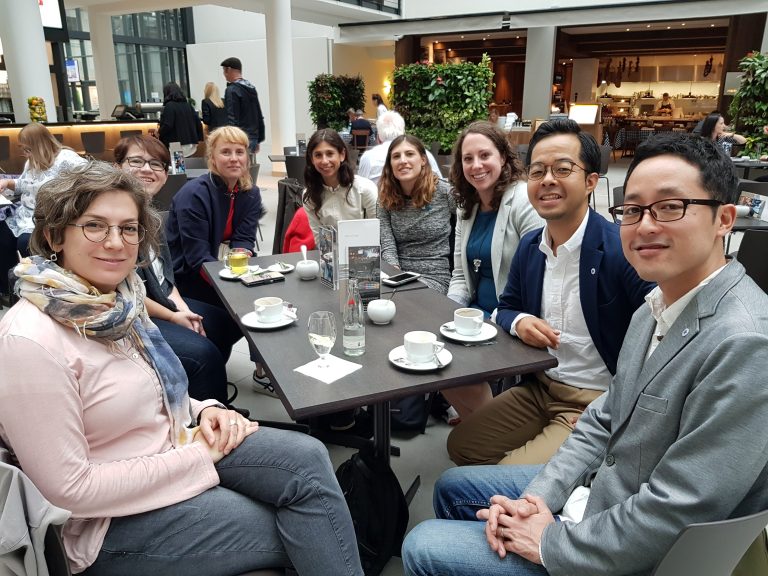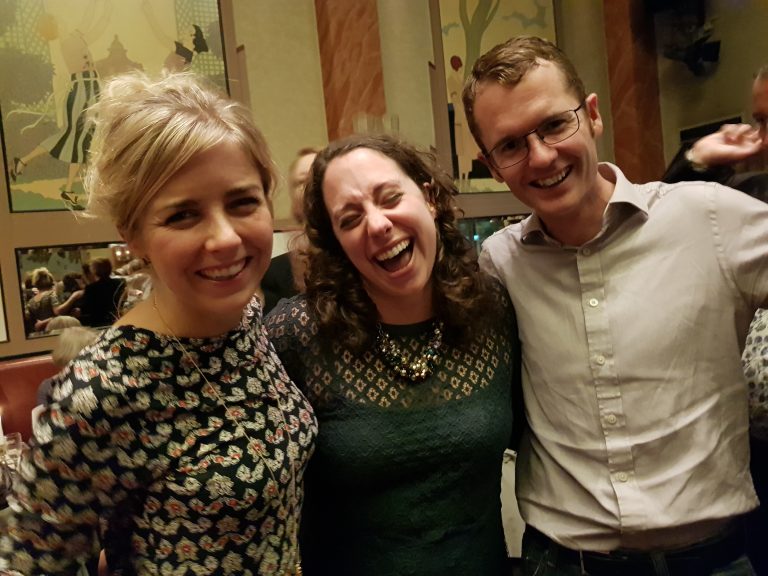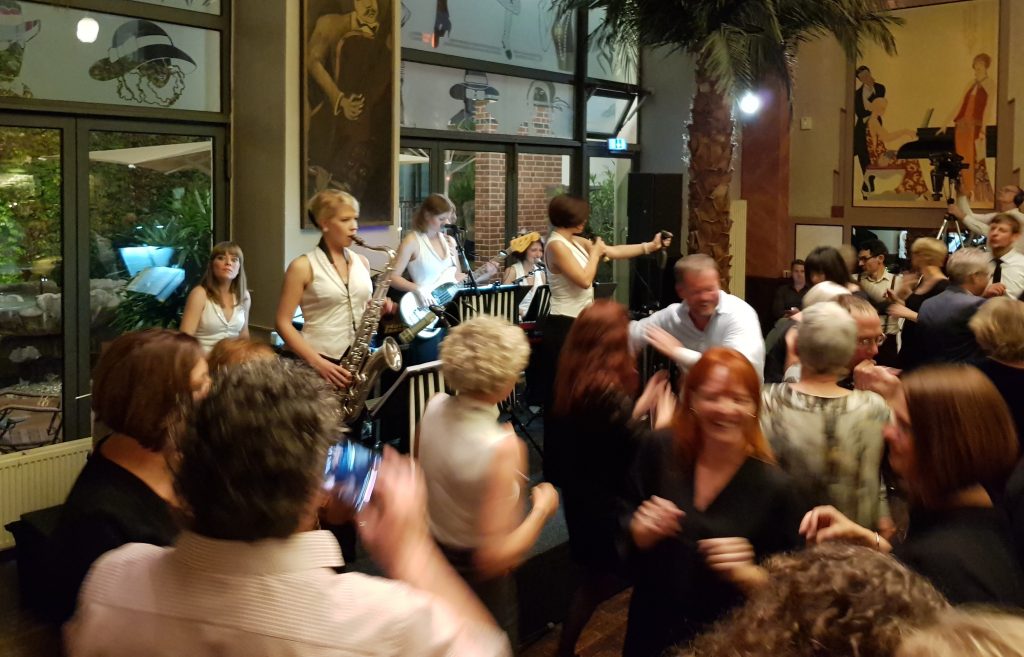The 27th Alzheimer Europe Conference “Care today, Cure tomorrow” in Berlin brought together close to 750 participants from 42 countries, including 181 speakers and 216 poster presenters. We were happy to hear that 38 people living with dementia attended who, together with their carers and supporters, were involved in the all the stages of planning the event.
“Time is on our side” was the title of the keynote presentation from Prof Alexander Kurz (Technical University of Munich) at the beginning of the conference. He highlighted his hope that a better and novel treatment will give people diagnosed with dementia a chance to spend more years at a mild and moderate state without ever reaching the most severe stages of disease. All this is only possible with an early diagnosis, which is a coin with two sides he says: it gives more time for a better treatment and future planning, but brings the risk of early depression.
Beside innovations in dementia diagnosis, treatment, eco-psychosocial (non-pharmalogical) therapy and care, there were several presentations about dementia strategies and the importance of including people living with dementia in their communities. Myrra Vernooij-Dassen, chairperson of INTERDEM, highlighted at the final round table the importance of social health, which includes participation and social engagement. She pointed out that future research should enhance the lives of people living with dementia.
Building on work by Alzheimer Europe to develop national dementia strategies across the continent, Knut Engedal from Norway stressed that those strategies that were funded and linked to measurable goals were the most successful in Europe . An important message to health policy, professionals and activists: investing in dementia care is worth it!

Another special focus was this year was the importance of prevention and the reduction of modifiable risk factors in mid-life. One of the highlights of the conference was Kate Irving from Ireland. She presented the InMindd Project, highlighting that only 5% of research funding is spend on studies of risk and preventive strategies in the context of dementia. This is surprising since risk reduction is potentially the most effective intervention we have available. There is no cure for dementia, but Kate estimates that 35% of dementia cases could be prevented by focussing on modifiable risk factors, echoing a recent study published here in the Lancet.
Another special focus was this year was the importance of prevention and the reduction of modifiable risk factors in mid-life. One of the highlights of the conference was Kate Irving from Ireland. She presented the InMindd Project, highlighting that only 5% of research funding is spend on studies of risk and preventive strategies in the context of dementia. This is surprising since risk reduction is potentially the most effective intervention we have available. There is no cure for dementia, but Kate estimates that 35% of dementia cases could be prevented by focussing on modifiable risk factors, echoing a recent study published here in the Lancet.
The knowledge of modifiable risk factors is low in public and general practitioners according to Kate, stressing that greater awareness of brain health would be invaluable in primary health care settings. She demonstrated the information on the InMindd project’s homepage – check it out!
To focus in the individuals with dementia and their carers, the first day of the conference started with a speech from Chris Roberts and his wife Jayne Goodrick (Wales, United Kingdom) who gave an emotional insight into their life with Chris´ dementia diagnosis. They spoke about the importance of their advocacy work and maintaining what they have been for so many years: husband and wife. Their testimonies were impressive – you can follow Chris on twitter: @mason4233. His wife Jayne stated very clearly: “Chris is not a burden, it is the unshared responsibility that is the burden”. They called for greater support for caregivers and people living with dementia.
Speaking to the abilities of people with dementia, Linda Örulv from Sweden from Linköping University talked about her work with self help groups for people with dementia. She addressed the misconception that people with dementia may be perceived as needing help in their social interactions. She challenged this myth by demonstrating that people with dementia in self help groups found many creative ways to deal with issues in communication and should not be underestimated. We believe this contributes to a more realistic and positive image of dementia.
However, the diagnosis of dementia can cause significant stress. Korlijn Joling reported the results of a study dealing with suicidal thoughts of carers of people with dementia, showing that carers need more support in the different stages of the dementia journey. You can find her paper published open access here.
Addressing in greater detail the issues experienced by carers, Bob Woods reported results of the “Carers study” that took place in 5 European counties. Unsurprisingly, most of the 1409 carers interviewed were female. Of these people, 47% stated that they thought the diagnosis should have been made earlier. We were shocked by the result that 33% of people who approached a health professional with concerns about cognition were told that nothing was wrong: there is still a lot of awareness raising needed! Bob also found that 40% of people with dementia refused to seek help, placing a greater pressure on carers.
As members of the World Young Leaders in Dementia Network, we were active as a group and with personal presentations. Verena Tatzer (University of Applied Sciences Wiener Neustadt, Austria @VerenaTatzer) and Wienke Jacobsen (Europe University Flensburg, Germany @wienke_jacobsen) were both involved with poster presentations. Verena presented her successful project on dementia friendly pharmacies in Austria. The toolbox she developed can be found here.

Wienke presented a regional dementia strategy, a social robot project and first results from her PhD about Mental Health Promotion within the MINDMAP cities project. Olivier Constant (@ECDementieVl) from the Flanders Expertise Centre on Dementia, Belgium, hosted a workshop before the official start of the conference with the aim of initiating an international network for Dementia Friendly Communities. We were particularly delighted to welcome Mollie Checksfield, WYLD’s North American Regional Coordinator, for a taste of the European approach to dementia and an experience of Berlin cabaret nightlife at the gala dinner!
WYLD ran a successful workshop on “Visions of Dementia Friendly Communities” with around 40 people discussing their ideas for the future of Dementia Friendly Communities and how young people should be involved. It was great to see people enthusiastic and optimistic about the future of this topic. If you want to know more the full report from this workshop will be coming very soon, so keep an eye on the WYLD website.
One great resource for dementia friendly communities we came across at the conference was developed by Prof. Takashi Iba @takashiiba. Check out his book, a great resource to talk about dementia for people with dementia, carers – and everyone else!
Social media
Following our twitter account is especially worthwhile for the conferences: we try to tweet about as many interesting sessions as possible to make it possible to get some information even without being present. See @wyldementia and #27AEC for all our tweets with lots of photos and information.
Iva Holmerová, Chairperson of Alzheimer Europe closed the conference with the words “Auf Wiedersehen Berlin and ¡Hola Barcelona!”, where the 28th Alzheimer Europe Conference “Making dementia a European priority” will take place from 29 to 31 October 2018.
We will be there!
Verena Tatzer, Wienke Jacobsen, Olivier Constant, Timothy Rittman





